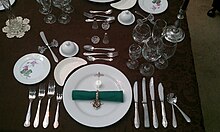This article needs additional citations for verification. (February 2019) |
A variety of eating utensils have been used by people to aid eating when dining. Most societies traditionally use bowls or dishes to contain food to be eaten, but while some use their hands to deliver this food to their mouths, others have developed specific tools for the purpose. In Western cultures, cutlery items such as knives and forks are the traditional norm, while in much of the East, chopsticks are more common. Spoons are ubiquitous.


History
editIn some cultures, such as Ethiopian and Indian, hands alone are used or bread takes the place of non-edible utensils. In others, such as Japanese and Chinese, where bowls of food are more often raised to the mouth, little modification from the basic pair of chopsticks and a spoon has taken place. Western culture has taken the development and specialization of eating utensils further, with the result that multiple utensils may appear in a dining setting, each with a different name and purpose. With the evolution of people's eating habits, further modification continues to take place, mostly in the West.
List of utensil types
edit- Spoon – List of types of spoons
- Fork – Western/Southeast Asian utensils
- Knife
- Chopsticks – East and Southeast Asian utensil
- Skewer
- Tongs
- Toothpick
- Cocktail stick
- Drinking straw
- Cutlery – A set of Western utensils: usually knife, fork and spoon
- Sujeo – A paired set of Korean utensils: a spoon and chopsticks
- Food pusher - a utensil with a blade set at 90° to the handle, used for pushing food onto a spoon or fork[1]
Utensils for specific foods
editSome utensils are designed for eating or preparing specific foods:
- Butter knife
- Cake fork
- Soup spoon
- Crab cracker
- Crab fork
- Fish knife
- Fondue fork
- Grapefruit knife
- Grapefruit spoon
- Lobster pick
- Snail tongs and forks
- Nutcracker
- Ice cream scoop
- Tongs for:
- Honey dipper
- Meat claws (used to shred barbecue meats such as brisket)
Combination utensils
editOver time, traditional utensils have been modified in various ways in attempts to make eating more convenient or to reduce the total number of utensils required. These are typically called combination utensils.
- Chopfork – A utensil with a fork at one end and chopsticks/tongs at the other.[3]
- Chork – Pointed and slightly curved tongs, which can be used like chopsticks (as pincers) or as a fork (for spearing).[4][5] A different kind of chork is a fork with a split handle, which can be broken in half to make two chopsticks.[6]
- Forkchops – Used in a pair, these are basically a pair of chopsticks with a small fork and knife on the non-pointed ends.[7]
- Spoon and Chopstick Hybrid – Pointed and slightly curved tongs, which can be used like chopsticks or as a spoon.
- Knife and Chopstick Hybrid – Pointed and slightly curved tongs, which can be used like chopsticks or as a knife.
- Knork – A knife with a single tine, sharpened or serrated, set into the anterior end of the blade.
- Pastry fork – A fork with a cutting edge along one of the tines.
- Spifork - A utensil consisting of a spoon, knife, and fork.[8][9][10]
- Spoon straw – A scoop-ended drinking straw intended for slushies and milkshakes.
- Sporf – A utensil consisting of a spoon on one end, a fork on the other, and edge tines that are sharpened or serrated.
- Spork – Spoon and fork
- Splayd – Spoon and fork and knife
- Spife – Spoon and knife.[11]
- FRED - Can opener, bottle opener, and spoon combination issued by the Australian Defence Force.[12]
Disposable utensils
editPrepackaged products may come with a utensil intended to be consumed or discarded after using it to consume the product. For instance, some single-serve ice cream is sold with a flat wooden spade, often erroneously called a "spoon", to lift the product to one's mouth. Prepackaged tuna salad or cracker snacks may contain a flat plastic spade for similar purposes.
See also
edit- Tableware – Items used for setting a table and serving food
- Drinkware
- Edible tableware – Utensil consistent of food or which can be eaten
- Eating utensil etiquette – Social conventions of cutlery usage
- List of food preparation utensils
- List of serving utensils
- Combination eating utensils
References
edit- ^ "Food Pushers". CooksInfo. Retrieved 18 October 2022.
- ^ Oulton, Randal (2018-05-10). "Asparagus Tongs". Cook's Info. Retrieved 2019-09-08.
- ^ "And all I got was this lousy.. Chopforks!". sinosoul.com. Retrieved 2013-05-30.
- ^ Gim, Sarah J. (2007-02-16). "Chork: Chopstick forks for your Asian fusion cuisine". Slashfood. Archived from the original on 2011-12-27.
- ^ Cognito (2007-03-27). "The Chork - AKA The Chopstick Fork". Trendhunter.com. Retrieved 2013-05-30.
- ^ "From Spork to Chork « Will BLANK For Food". Willblankforfood.net. 2010-06-02. Archived from the original on 2013-05-12. Retrieved 2013-05-30.
- ^ Tisah Tucknott. "Cheater Chopsticks - Forkchops Lets Westerners Eat Like Asians (GALLERY)". Trendhunter.com. Retrieved 2013-05-30.
- ^ "Combination eating utensil".
- ^ "Spifork".
- ^ "TESS -- Error".
- ^ "The Nutella Spife". The Cutlery Review. Archived from the original on 2018-10-24. Retrieved 2019-06-13.
- ^ "Australian field ration eating device | Australian War Memorial". www.awm.gov.au. Retrieved 2023-10-29.